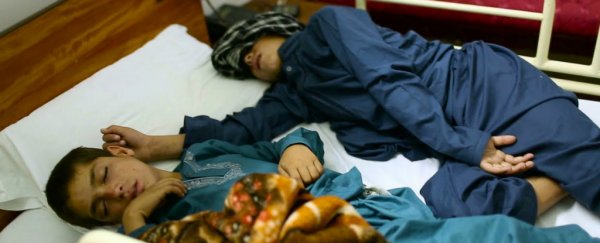During the day, 13-year-old Shoaib Ahmed and his 9-year-old brother Abdul Rasheed are like any other kids - they go outside, walk, and play with their friends.
But when the sun sets, the Pakistani brothers become paralysed, and are unable to move or speak again until the sun rises. It's the first known report of these symptoms, and doctors have no idea what's causing them.
"We took this case as a challenge," Javed Akram, a professor of medicine at the Pakistan Institute of Medical Sciences, told the Associated Press.
"Our doctors are doing medical tests to determine why these kids remain active in the day but cannot open their eyes, why they cannot talk or eat when [the] sun goes down."
The brothers have been nicknamed the 'solar boys', and since the start of this year, they've been living under observation in a hospital in Islamabad, Pakistan. Their care is all free of charge, and they've undergone more than 300 tests so far.
The first thing the doctors had to look into was the idea that the condition was somehow related to sunlight itself, rather than time of day - the boys' father told the Associated Press he thought they were getting their energy from the Sun.
But that (slightly bizarre) hypothesis has now officially been ruled out, because the doctors showed that the boys were able to move around during the day in a dark, enclosed room.
They've also shown that the boys aren't suffering from temporary paralysis caused by nerve damage, or sleep paralysis, which is where the body remains paralysed during REM sleep while the brain stays awake.
It's more likely that the unique condition is somehow related to genetics - the boys' mother and father are first cousins, a practice that's not uncommon in Pakistan.
But the doctors are unsure which genes could be having such a severe and isolated effect on the boys' behaviour.
Two other brothers in the family previously died, apparently from the same condition, but the boys have a sister who's unaffected.
The doctors are now collecting soil and air samples from the family's home village, and has sent the brother's blood samples overseas for genetic testing and further examination.
(Note: At one point the video above mixes up the name of the older brother, Shoaib, and the father, Mohammad.)
The strangest part of the condition is that the boys really do seem unaffected during the day time.
"I will become a teacher," Shoaib Ahmed told the Associated Press back in May, while his younger brother said he wanted to be an Islamic scholar.
The good news is that the doctors have been trialling a range of medicines on the boys to help relieve the condition, and have had some positive results.
"These boys will now hopefully have a near-normal life with the help of the medicines," Akram told Barcroft Media.
Hopefully with more research, we'll start to get an idea of what might be causing the strange symptoms in the first place, so they can stop anyone else from going through the same thing.
